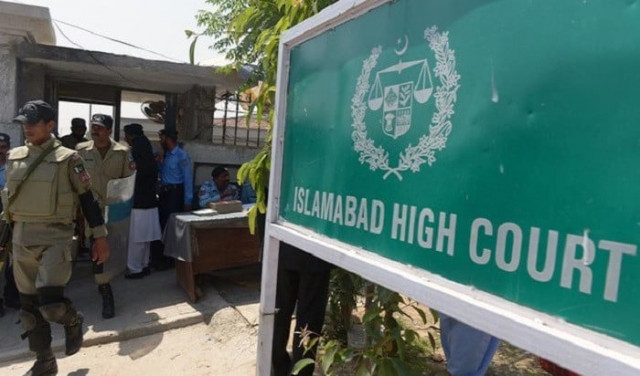IHC throws out PTI challenge to section 144 in capital
Ruling says law, order remain executive’s domain

The Islamabad High Court dismissed as “meritless” a petition filed by Asad Umar and Ali Nawaz Awan of the Pakistan Tehreek-e-Insaf (PTI) against the imposition of section 144 of the Criminal Procedure Code (CrPC), saying that the mere enforcement of this section was not a violation of fundamental rights.
Announcing the reserved judgment, IHC Chief Justice Athar Minallah said that the PTI still had a substantial representation in the National Assembly and the Senate and it could bring a bill in parliament to repeal the section 144.
In the petition, filed through senior lawyer Babar Awan, Asad Umar and Ali Nawaz Awan invoked the jurisdiction of the IHC under Article 199 of the Constitution, challenging the vires of the section 144 of the CrPC in public interest.
The judgment said that section 144 explicitly showed that the power had been conferred upon the executive authorities in order to protect the citizens from harm and to prevent unlawful disturbance.
“In case the petitioners intend to take out a rally, or to organize a protest or assembly, then they are advised to approach the competent authority for seeking permission in accordance with the principles and law enunciated by the august Supreme Court,” the judgment said.
“The petitioners continue to enjoy their status as members of the Majlis-e-Shoora (Parliament). Pakistan Tehrik e-Insaf has a significant membership in both the Houses. The political party, therefore, has an adequate remedy by way of tabling a Bill regarding repeal of section 144 of Cr.P.C.,” it further said.
According to the five-page ruling, the maintenance of the law and order or preventing disturbance of public tranquillity fell within the exclusive domain of the executive authorities, adding that executive’s decisions regarding handling of rallies, protests or assemblies “are not justiciable”.
Furthermore, the ruling said that a court was not equipped or competent to substitute the executive authorities’ assessments and opinions. However, it added that if an act of a public functionary could demonstrably be shown as an abuse of powers then the court would treat a petitioner as an ‘aggrieved person’ in the context of Article 199 of the Constitution.
“Admittedly, the petitioners have not alleged any act of a public functionary that would tantamount to exercising powers under section 144 of Cr.P.C. in violation of the fundamental rights. Mere imposition of section 144 Cr.P.C. sans an illegal act or excessive use of powers by public functionaries does not in any manner violate the fundamental rights guaranteed under the Constitution,” the ruling said.
“No political party or group of persons can claim a right to hold rallies, protests or other assemblies in disregard to the principles and law highlighted by the apex Court in the aforementioned judgment. The power conferred under section 144 of Cr.P.C. is meant to be exercised solely in public interest,” it added.
“An unregulated rally, protest or assembly definitely offends the guaranteed rights of the citizens who are not associated therewith. It is a constitutional obligation of the executive authorities to protect the rights of the public while considering a request by a group or political party to hold a rally or to organize protest or assembly.”
During the proceedings, the chief justice remarked that the PTI has governments in two provinces and questioned whether Section 144 has never been implemented there.
“This party has a government in Punjab and Khyber-Pakhtunkhwa. First, abolish this law from those provincial assemblies and then come here,“ he added.
Advocate Awan argued that "this law can remain in force for a maximum of seven days or two consecutive days in a month. It is written in the law."



















COMMENTS
Comments are moderated and generally will be posted if they are on-topic and not abusive.
For more information, please see our Comments FAQ